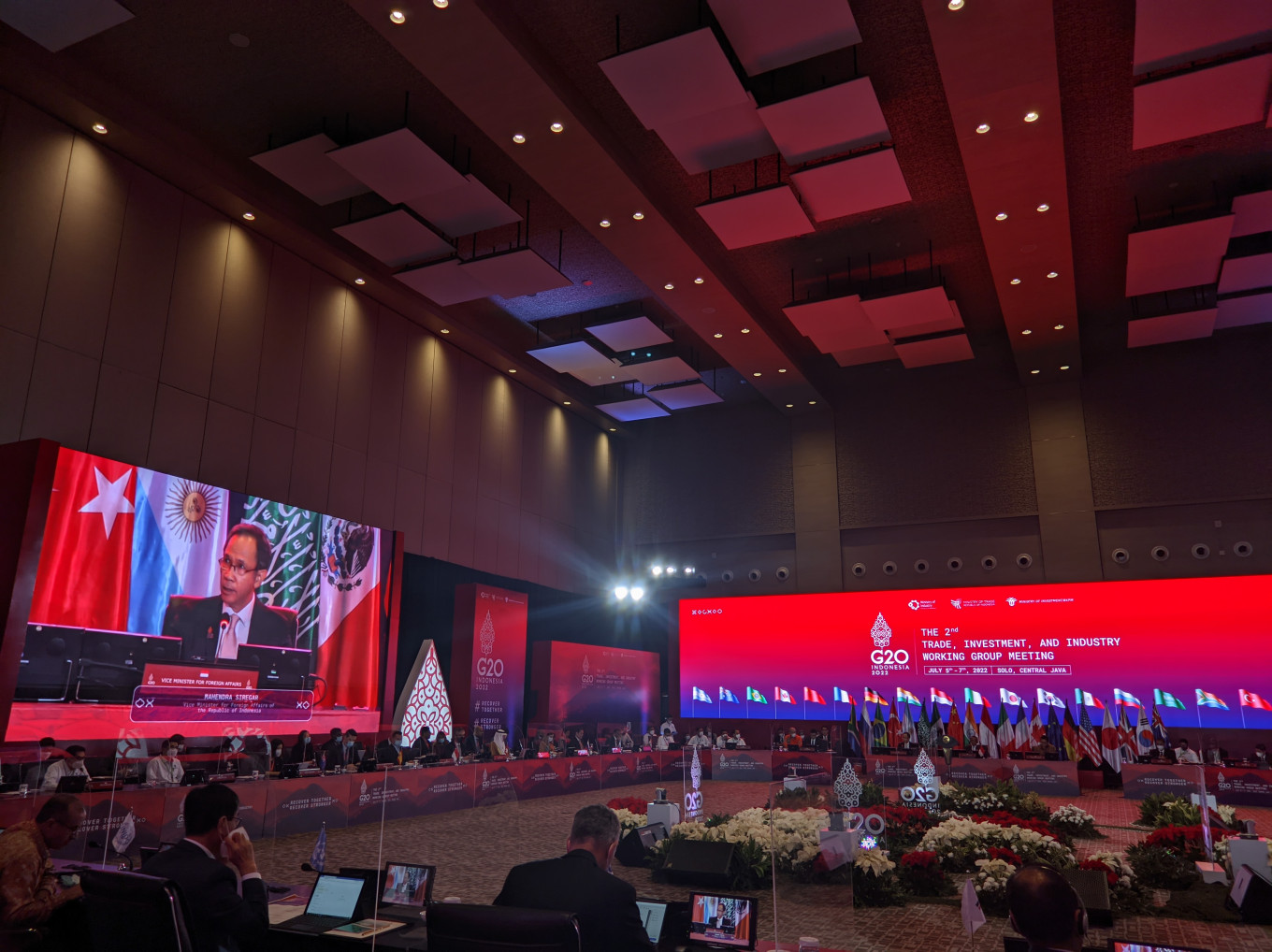Popular Reads
Top Results
Can't find what you're looking for?
View all search resultsPopular Reads
Top Results
Can't find what you're looking for?
View all search resultsIndonesia calls for Russian, Ukrainian goods reintegration in global markets
Statistics Indonesia (BPS) recorded that wheat prices have increased 75.71 percent year-on-year (yoy) and overall food and beverage prices have increased 8.26 percent.
Change text size
Gift Premium Articles
to Anyone

The Indonesian government has asked members of the G20 to reintegrate both Russian and Ukrainian exports to the global market as a means to reduce inflation and restore economic growth.
While giving opening remarks at the G20 Second Trade, Investment and Industry Working Group (TIIWG) meeting in Surakarta, Central Java, on Wednesday, Deputy Foreign Minister Mahendra Siregar said that geopolitical circumstances have borne the fruit of skyrocketing commodity prices.
Ever since the war in Ukraine started in February, the United States and its allies have been imposing economic sanctions on Russia as a means to grind the latter's war capability down, including trade restrictions on goods and services that are influenced by Russian President Vladimir Putin’s oligarchs.
"While we all hope for an end to this conflict, we must, in the meantime, strive to mitigate the energy and food crisis that is affecting all nations through reintegration of both countries' commodities to global markets. Despite the war," Mahendra told G20 members.
Read also: Russia ready to fulfill Indonesia’s demand for fertilizers
Several sectors that are impacted by the war and its sanctions, according to Mahendra, include wheat. Combined, both countries' outputs are estimated to have accounted for 25 percent of the global supply before the war started.
He further said that 75 percent of trade in sunflower oil, a key component of the food industry, and 20 percent of global fertilizer supply were also disrupted as battle rendered production facilities unable to operate their daily activities.
Statistics Indonesia (BPS) data show that wheat prices have increased 75.71 percent year-on-year (yoy) and 5.45 percent month-to-month (mtm), as overall food and beverage prices have increased 8.26 percent yoy and 1.26 percent mtm. Fertilizer prices have increased 16.30 percent yoy.
"The current geopolitical circumstances weigh heavily on commodity markets, disrupting food and energy trade, and the impact is accentuated for developing countries facing food insecurity and a great number, extreme poverty," Mahendra continued.
Due to these reasons, Mahendra hoped that the G20 could serve as a 'first responder' to the current global food-and-energy-prices crisis by reforming the multilateral system, such as keeping global markets stable and reducing the barriers of trade.
Read also: Inflation soars more than expected, driven by food prices
Speaking in the same event, Investment Minister Bahlil Lahadalia said that the paramount importance of this event rests on its ability to deliver a fairer international-trade system on the World Trade Organization (WTO), a more equitable investment on renewables within developing countries and a global industry that could sustain the current health environment.
"High inflationary pressures and the limited availability of food and energy in the world can reduce people's purchasing power and increase people's vulnerability, especially in developing countries, to fall into poverty," Bahlil said.
Previously on June 30, President Joko “Jokowi” Widodo talked with Putin about the necessity to secure the supplies of food and fertilizers from both Russia and Ukraine in the global markets due to increasing prices.
In response, the Russian leader has openly affirmed that his country is ready to export nitrogen, phosphorus and potassium fertilizers to Indonesia and other 'friendly countries', so that domestic agricultural producers' demands are fulfilled.
"We certainly intend to continue fulfilling in good faith all of our contractual obligations for the supply of food, fertilizer, energy resources and other critical goods. In this context, we consider it vital to restore the supply chains disrupted by sanctions," Putin said in a joint press conference with Jokowi in Moscow, on June 30.










